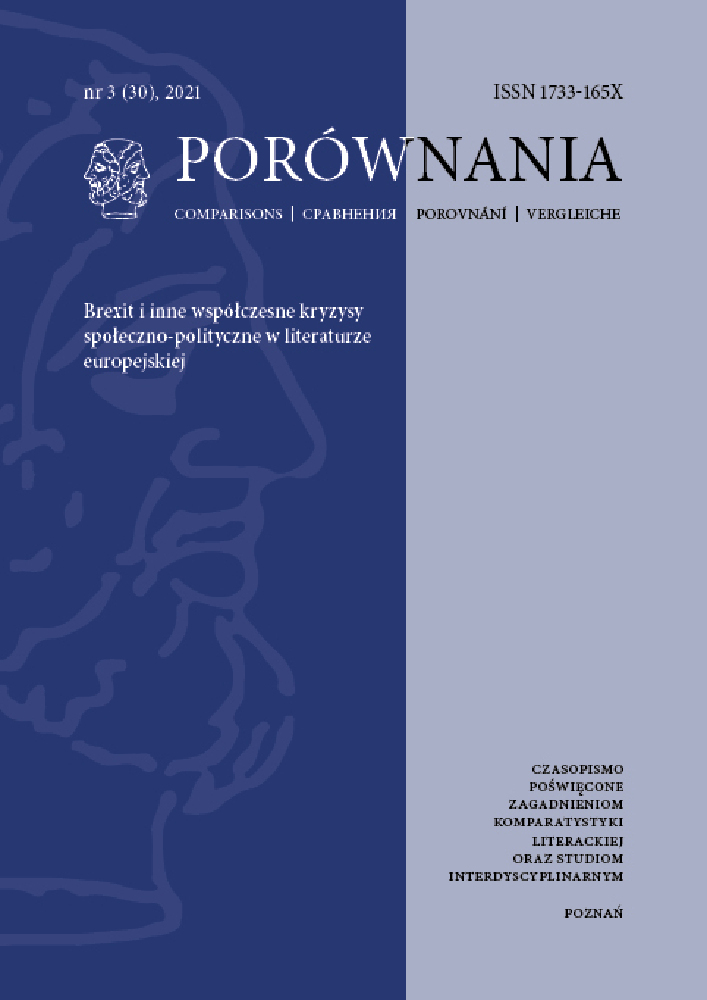Аннотация
Tekst włącza się w dyskusję o ruchach migracyjnych, aktualizujących kwestię podziałów społeczno-kulturowych także między społeczeństwami europejskimi o silnie ukształtowanych (a dodatkowo wewnętrznie zróżnicowanych) tożsamościach zbiorowych. Stawia tezę, że analizując doświadczenia polskich migrantów ekonomicznych w Wielkiej Brytanii, można też dostrzec zasadnicze problemy polskiej transformacji ustrojowo-gospodarczej w jej aspekcie społeczno-kulturowym, które w zderzeniu migracyjnych podmiotów (podporządkowanych, zmarginalizowanych) z nowym środowiskiem szybciej niż w kraju utraciły przezroczystość i nabrały cech dyskursywnych. Wywód koncentruje uwagę na spotkaniu polskiego Swojaka (przeciętnej jednostki, uosabiającej polską peryferyjną wersję normy cywilizacyjno-kulturowej, która wyraźnie separuje Swoich od Obcych) z sytuacją, w której ów Swojak sam zajmuje, jako migrant, pozycję Obcego. Przykładowego materiału do rozważań dostarcza tom reportaży Ewy Winnickiej Angole (2014). W warunkach, w których kondycja polskiego migranta bywa przezeń (często) mimowiednie problematyzowana, podmiot taki dokonuje autoobserwacji oraz próbuje (z różnym skutkiem) odnaleźć się w relacji do miejscowych brytyjskich Swojaków, a więc źródła normy, wobec której, jako przybysz, sytuuje się na zewnątrz. Ma przy tym do dyspozycji głównie instrumenty, które – uwewnętrzniona przezeń, a powstała w innych warunkach – polska norma przewiduje do użycia w relacji z Obcym. Paradoksalność tych okoliczności, poza wszystkim innym, daje asumpt populistycznej instrumentalizacji generowanych przez nie zjawisk, co skutecznie wykorzystali zwolennicy brexitu.
Библиографические ссылки
Certeau Michel de (2008), Wynaleźć codzienność. Sztuki działania, przeł. Katarzyna Thiel-Jańczuk, Wydawnictwo Uniwersytetu Jagiellońskiego, Kraków.
Craps Stef (2015), Poza eurocentryzm. Teoria traumy w epoce globalizacji, przeł. Jan Burzyński, w: Antologia studiów nad traumą, red. Tomasz Łysak, Universitas, Kraków, s. 417–443.
Czapliński Przemysław (2009), Polska do wymiany. Późna nowoczesność i nasze wielkie narracje, W.A.B., Warszawa.
Dąbrowski Mieczysław, (2016), Życie na Wyspach, w: tenże, Tekst międzykulturowy. O przemianach literatury emigracyjnej, Elipsa, Warszawa, s. 300–332.
Dobrogoszcz Tomasz (2016), Przeciw stereotypom: mimikra a hybrydyczność. Współczesna proza polska na tropie tożsamości polskich migrantów w Wielkiej Brytanii, „Teksty Drugie”, nr 3, s. 42–59.
Douglas Mary (2007), Czystość i zmaza, przeł. Marta Bucholc, PIW, Warszawa.
Jacyno Małgorzata (1999), Iluzje codzienności. O teorii socjologicznej Pierre’a Bourdieu, Wydawnictwo IFiS PAN, Warszawa.
Kornhauser Julian (1978), Zjadacze kartofli, https://tinyurl.com/4rkaz9rv [dostęp: 18.01.2021].
Luckhurst Roger (2008), The Trauma Question, Routledge, London.
Pajor Magdalena (1999), Przemoc jako kategoria filozoficzno-artystyczna, „Sztuka i Filozofia”, nr 17, s. 162–174.
Pratt Mary Louise (2011), Imperialne spojrzenie. Pisarstwo podróżnicze a transkulturacja, przeł. Ewa Elżbieta Nowakowska, Wydawnictwo Uniwersytetu Jagiellońskiego, Kraków.
Waldenfels Bernhard (2002), Topografia obcego. Studia z fenomenologii obcego, przeł. Janusz Sidorek, Oficyna Naukowa, Warszawa.
Winnicka Ewa (2014), Angole, Wydawnictwo Czarne, Wołowiec.
Лицензия
Utwory opublikowane w czasopiśmie „Porównania”, na platformie Pressto należącej do Uniwersytetu im. Adama Mickiewicza w Poznaniu są udostępniane na licencji Creative Commons Uznanie autorstwa - Bez utworów zależnych 4.0 Międzynarodowe (CC BY-ND 4.0)
Tym samym wszyscy zainteresowani są uprawnieni do korzystania z utworów opublikowanych pod następującymi warunkami:
-
uznania autorstwa — czyli obowiązek podania wraz z rozpowszechnianym utworem informacji o autorstwie, tytule, źródle (odnośniki do oryginalnego utworu, doi) oraz samej licencji
-
bez utworów zależnych — remiksując, przetwarzając lub tworząc na podstawie utworu, nie wolno rozpowszechniać zmodyfikowanych treści.
-
brak dodatkowych ograniczeń — nie można korzystać ze środków prawnych lub technologicznych, które ograniczają innych w korzystaniu z utworu na warunkach określonych w licencji.
Uniwersytet im. Adama Mickiewicza w Poznaniu zachowuje prawo do czasopisma jako całości (układ, forma graficzna, tytuł, projekt okładki, logo itp.).
Autor zachowuje prawa majątkowe, ale udziela zgody Uniwersytetowi im. Adama Mickiewicza w Poznaniu na wykorzystanie dzieła. Autorzy tekstów zakwalifikowanych do publikacji proszeni są o wypełnienie podpisanie i przesłanie umowa (PL) agreement (EN)
Agreement for granting a royalty-free license to works with a commitment to grant a CC sub-license





